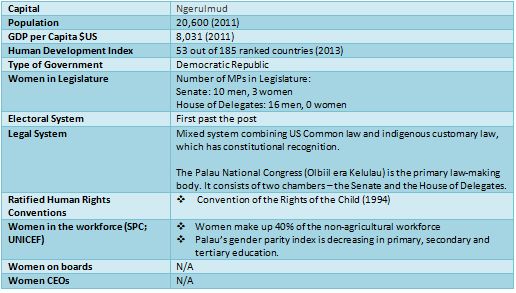Palau

The Republic of Palau is a North Pacific Island nation that lies west of the Federated States of Micronesia and is made up of more than 340 islands. Palau has a multi-ethnic population inhabiting eight islands with more than 80% of the population concentrated on Koror[1]. Tourism accounts for approximately 50% of the Palauan economy and makes up more than 95% of service exports[1]. Palau is classified as an upper middle income country and is one on the richest Pacific Island countries on a per capita basis. Foreign aid, predominantly from the United States of America, makes up almost 30% of gross domestic product[1].
Women and the Law
Under the constitution of Palau, women are afforded equality of opportunity with men; recommendations by the association of women’s chiefs (Mechesil Belau) are said to be given high consideration in legislative matters[1].
Palau is one of only seven countries in the world not to be a signatory of the Convention on the Elimination of all forms of Discrimination Against Women (CEDAW), however, it has recently passed the Family Protection Act 2013. Customary law has constitutional status in Palau and the application of customary practices influences formal criminal procedures. Palau has no sexual harassment, human trafficking or sex tourism legislation. The definition of rape is limited to sexual intercourse and spousal rape is still exempt from prosecution. The common law rule requiring proof of physical resistance in order to prove absence of sexual consent is still applied, as is the defence of reasonable belief that a victim was of lawful age of consent.
Fault-based divorce is practised in Palau and division of matrimonial property in cases of divorce does not take non-financial contribution into consideration.
Palauan women are able to vote and can participate as candidates in the elections for president, the 16 members of the National Congress, and the 13-member Senate.
Violence Against Women
Available data suggests high levels of domestic violence. According to the 2007 Youth Risk Behaviour Survey, 21% of students had been forced to have sex against their will and 13% had been physically assaulted (by boyfriends or girlfriends) in the past year. There are on average 90 cases of domestic violence reported annually, but the actual extent of intimate partner violence and violence against women and girls is not well documented[1]. A UNFPA-supported Family Health and Safety Study was completed in Palau in 2013 in order to gain a more concrete understanding on the extent of gender-based violence in Palau. The report is expected to be released in 2014.
Women’s Health
No accurate data exists for maternal mortality rates. The adolescent birth rate is 27, an increase on 1995’s rate, and 100% of recorded births in 2007 were attended by a skilled attendant.
The World Health Organisation estimated that non-communicable diseases account for 74% of all deaths, with at least 38% of female deaths in women younger than 60 in 2010 being attributed to this. Approximately 53% of women over the age of 20 years are classified as obese.
The 2008 Second Generation Survey was undertaken and, based on responses from 44 young women aged 15 to 24, results showed that just over a quarter of the women (26.8%) answered all HIV knowledge questions correctly. Only 19% of respondents had had sex with more than one partner in the past 12 months, however, none of them used a condom in their last sexual encounter[1].
Women and the Environment
In 2005, as part of a global Environmental Vulnerability Index (EVI) produced by UNEP and SOPAC, Palau was ranked as ‘highly vulnerable’. Annual and seasonal maximum and minimum temperatures have increased at Koror at a rate of 0.11°C per decade since 1953. These temperature increases are consistent with the general pattern of global warming. Satellite data indicate the sea level has risen in Palau by about 0.35 inches (9mm) a year since 1993. This is larger than the global average of 0.11-0.14 inches (2.8-3.6mm) per annum. This larger-than-usual rise may, however, be partially caused by the operation of natural phenomena.
UN Women in Palau
Advancing Gender Justice in the Pacific (AGJP) Programme: UN Women is continuing its advocacy initiatives to promote women’s political participation, providing knowledge products on harmonised human rights treaty reporting and implementation as well as training for women candidates running for elections. UN Women will also support the government in order to increase access to gender-responsive legal systems for women.
Ending Violence against Women (EVAW) Programme: This programme provides stakeholders with access to virtual knowledge platforms, tools and evidence-based resources to better equip them with the knowledge and evidence to advocate for strengthened EVAW legislation, improved policies and services for violence against women survivors. Social media tools are also made available to support community mobilisation that aims to end violence against women and girls, through campaigns such as the United Nations Secretary General’s UNiTE to EVAW and Say NO-UNiTE.
Women’s Economic Empowerment (WEE) Programme: UN Women is supporting informed and evidence-based decision-making when it comes to gender issues by assisting in the production of nationally-generated disaggregated data and statistics on the economic situation of women.
Increasing Community Resilience through Empowerment of Women to Address Climate Change and Natural Hazards (IREACH) Programme: UN Women supports the incorporation of gender dimensions in strategic documents for disaster risk management and climate change through the provision of knowledge products and tools on the gendered implications of climate change and disasters.
[1] UNDAF country assessment